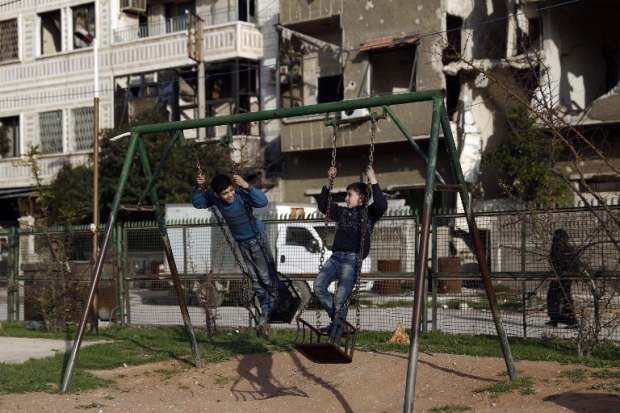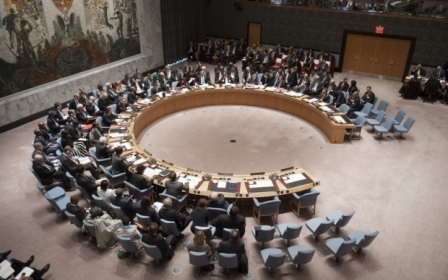Air strikes in Aleppo and Hama on second day of ceasefire

Several villages in northern and central Syria were hit by air strikes on Sunday but the main frontlines between pro-government forces and opposition rebels remained mostly quiet as the country's partial ceasefire continued for a second day.
Rival parties to the agreement accused others of violating the truce as reports of sporadic clashes involving various combinations of pro-government forces, opposition rebels, Kurdish fighters, Islamic State (IS) militants disturbed the relative calm.
Saudi Arabia accused Russia, which has been conducting an intensive air campaign against opposition groups in support of Syrian President Bashar al-Assad, of targeting "moderate opposition" groups in violation of the agreement, while the main Syrian opposition group said it had lodged 15 violations of the ceasefire by Syrian government forces and their allies.
Russia reported alleged breaches of the truce deal by Turkey relating to an attack it said was partially launched from Turkish territory by IS fighters on the Kurdish-controlled town of Tal Abyad, as well as by rebel groups.
But Salem al-Meslet, a spokesperson for the High Negotiations Committee (HNC), the main opposition group, said: "We have violations here and there, but in general it is a lot better than before and people are comfortable."
The UK-based Syrian Observatory for Human Rights said seven villages in the provinces of Aleppo and Hama had been bombed by warplanes believed to be either Syrian or Russian, with one person reported killed.
Russia on Saturday had said that it would halt all air strikes for 24 hours to avoid “bombing mistakes” on the first day of the ceasefire, which came into effect at midnight local time (Friday 10 pm GMT).
In Aleppo city, the subject of intensive Russian air strikes in previous weeks, residents reported a second consecutive night of relative calm.
“There's something strange in this silence. We used to go to sleep and wake up with the sound of raids and artillery,” Abu Omar, 45, who runs a bakery in rebel-held east Aleppo, told the AFP news agency.
“I'm happy, but sad for regions that are not covered by the truce and whose inhabitants continue to suffer,” he said.
The ceasefire, which was brokered by the US and Russia and has been accepted by the Syrian government and the main opposition umbrella organisation and scores of rebel groups, marks the first formal pause in fighting since Syria's civil war began almost five years ago.
Ceasefire 'stillborn'
Questions remain about how long it will hold and how widely it will be implemented, with Syria and Russia stating that they will continue to fight against “terrorist” organisations excluded from the agreement, including the Islamic State (IS) group and the al-Qaeda-affiliated Nusra Front.
The Nusra Front has operated for years alongside other factions in areas including Aleppo, raising concerns among other rebel groups that they could be caught up in attacks ostensibly targeting Nusra.
A commander in the hardline Islamist faction Ahrar al-Sham said his group, which is considered to be allied with Nusra, had not conducted any military operations since the truce started.
"But the ceasefire is stillborn because it began with violations from the regime. It will be very difficult for the ceasefire to hold," Hussam Salameh warned.
A spokesperson for the Free Syrian Army-aligned Jaish al-Nasr told Reuters that government troops had fired mortars, rockets and machine guns in Hama province and said that rebels considered the truce had been broken.
In Damascus, Syria's SANA state news agency said that rebels in eastern districts had shelled residential areas, although there were no reports of casualties.
A Turkmen rebel commander said on Sunday that Turkmen forces in Aleppo province had come under attack from Kurdish forces within minutes of the ceasefire coming into effect, and had also been attacked by pro-government forces.
"Today, under the ceasefire, we lost 10 martyrs and 20 injured," said Mahmut Suleyman Zengin, commander of the Syria Turkmen Front’s Fatih Sultan Mehmet Brigades, according to the Turkish state-run Anadolu news agency.
Syria's main opposition grouping recorded 15 violations by government troops and allied forces on the first day of a landmark truce, a spokesman told reporters on Sunday.
"There were 15 violations by the regime forces on day one of the ceasefire, including two attacks by (Lebanese militant group) Hezbollah in Zabadani" west of Damascus, said Salem al-Meslet, spokesman for the High Negotiations Committee (HNC).
The Russian military said it had recorded nine violations of the ceasefire, but said that on the whole it was being implemented.
In Washington, a senior US official told the AFP news agency that "setbacks are inevitable" and urged all sides to be patient.
"Even under the best of circumstances, we don't expect the violence to end immediately. In fact, we are certain that there will continue to be fighting, in part because of organisations like ISIL and al-Nusra," he said, using an alternative acronym for IS.
'Positive assessment'
An international task force set up to monitor the fighting co-chaired by the US and Russia said on Saturday that the ceasefire had so far been largely successful.
"The United Nations, the United States and Russia have made a positive assessment of the first hours of the cessation of hostilities," a Western diplomat said after a meeting of the International Syria Support Group in Geneva.
The UN reported "some incidents" in apparent violation of the truce, but "they have been defused," he said.
Russian Foreign Minister Sergei Lavrov and US Secretary of State John Kerry spoke to each other on Saturday to express support for the implementation of the ceasefire and to discuss ways of supporting it through cooperation between their militaries, Russia's foreign ministry said.
Sporadic shelling and gunfire has been reported on frontlines between pro-government forces and opposition groups since the ceasefire began, while fierce fighting has occurred between IS millitants and fighters of the Kurdish YPG (People's Protection Units) in the town of Tal Abyad and the surrounding area near the border with Turkey.
The US-led coalition against IS also continued bombing the group in Syria on Saturday, conducting eight strikes including one in support of the YPG in Tal Abyad.
The Observatory said on Sunday that more than 70 IS fighters and 20 YPG fighters had been killed after IS launched an attack that threatened Kurdish control of the town.
The Russian military said some of those involved in the attack had come from Turkish territory and added that it had demanded an explanation from the US, which is a NATO ally of Turkey but has supported Kurdish opposition groups in Syria.
"Overnight from February 27 to 28 the Russian centre for the reconciliation of the warring parties in Syria received information about an attack from Turkish territory on the Syrian town of Tal Abyad by armed units using large-scale artillery," said Lieutenant General Sergei Kuralenko.
Staffan de Mistura, the UN's envoy to Syria, has described the ceasefire as the “best opportunity” to secure a peace deal since the war began and has called for peace talks to resume on 7 March if the ceasefire holds and more aid convoys are able to reach war-stricken areas.
A spokesperson for the UN's humanitarian affairs office told AFP that the next convoys would leave on Sunday and that aid had already reached tens of thousands of people in besieged cities over the past week.
New MEE newsletter: Jerusalem Dispatch
Sign up to get the latest insights and analysis on Israel-Palestine, alongside Turkey Unpacked and other MEE newsletters
Middle East Eye delivers independent and unrivalled coverage and analysis of the Middle East, North Africa and beyond. To learn more about republishing this content and the associated fees, please fill out this form. More about MEE can be found here.





